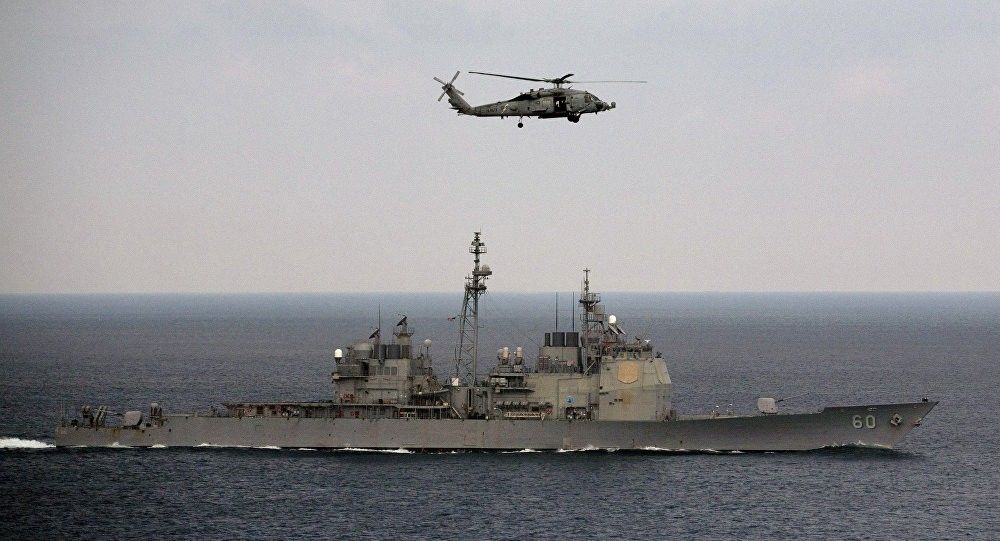US ‘disinvites’ China to Pacific Rim military exercises

WASHINGTON – The Pentagon has withdrawn its invitation to the Chinese Navy to the 2018 Rim of the Pacific (RIMPAC) military exercises in response to Chinese militarization of the South China Sea.
Chinese state councilor and foreign minister Wang Yi said the US decision was “non-constructive.” China’s defense ministry expressed regret over the withdrawal of the invitation.
RIMPAC, previously attended by China, is billed as the world’s largest international maritime exercise held every two years in Hawaii in June and July.
Wang, in his first ever meeting in Washington with Secretary of State Mike Pompeo, said the move was unhelpful to US-China mutual understanding.
Pompeo said he raised US concerns about the militarization of the sea with Wang but “I will leave it to our militaries to talk about their efforts together.”
At a joint news briefing after their talks, Wang said it was his hope the US will change its negative mindset.
“On the so-called militarization in the South China Sea,” he said China was only building civilian and some necessary defense facilities on its own islands.
“That is the right to self-defense and preservation of every sovereign state. It is a normal deployment and has nothing to do with militarization, just like the US has military presence in Hawaii, in Guam. And China’s deployment is at a much smaller scale than the US. It’s just out of necessary defense purposes. We don’t hope to see any exaggeration or hype-up of this matter,” Wang said.
The South China Sea is one of the most contested areas in the world with overlapping territorial claims by China, the Philippines and Vietnam, among several other claimants.
According to US intelligence reports, the Chinese military has installed weapons systems on artificial islands in Spratly (called Nansha by the Chinese) east of the Philippines. They are capable of striking ships some 300 nautical miles away.
Eric Sayers, an adjunct fellow at Washington’s Center for Strategic and International Studies, called the missile deployment “a major escalation.”
He had accurately predicted one immediate US response could be to rescind Beijing’s invitation to this year’s RIMPAC.
China sees its participation in the exercise as a sign of its acceptance among the world’s maritime powers.
In a brief statement, China’s defense ministry said the US had “ignored the facts and hyped up the so-called ‘militarization’ of the South China Sea, using it as an excuse to disinvite China.
“This decision by the United States is not constructive. Closing the door to communication at any time is not conducive towards promoting mutual trust and communication between the Chinese and US militaries,” it added.
China’s island-building program in the South China Sea and the West Philippine Sea has sparked concern around the region and in Washington about Chinese intentions.
China says it has every right to build what it calls necessary defensive facilities on its own territory.
Over the weekend China’s air force landed bombers in the South China Sea as part of a training exercise, triggering concern from Vietnam and the Philippines.
The ministry reiterated that its building of defense facilities was to protect the country’s sovereignty and legitimate rights, and had nothing to do with militarization.
“The United States has no right to make irresponsible remarks about this,” it added.
“Being invited or not cannot change China’s will to play a role in protecting peace and stability in the Asia-Pacific region, and cannot shake China’s firm determination to defend its sovereignty and security interests.”
It is in both countries’ interests to develop healthy military ties, and China hopes the United States keeps the broader picture in mind, abandon its “zero sum” mentality and appropriately handle disputes, the ministry said.
Pentagon officials have long complained that China has not been candid enough about its rapid military buildup and using South China Sea islands to gather intelligence in the region.
Chinese officials have accused Washington of viewing their country in suspicious, “Cold War” terms.
Speaking at a separate briefing, Chinese foreign ministry spokesman Lu Kang said China has sovereign rights in the South China Sea and it is not realistic for the United States to use this kind of action to try to coerce Beijing.
The US has dispatched warships to disputed areas of the South China Sea in a bid to challenge China’s extensive sovereignty claims in the territory. – With Pia Lee-Brago, Reuters
- Latest
- Trending





























